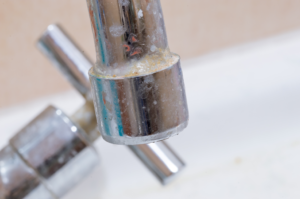
If not, you needn’t look any further for an answer. Below, we’re going to assess the negative effects of hard water, while demonstrating the ways in which soft water is superior.
Mineral Buildup on Pipes
Over time, as hard water runs through pipes, it leaves deposits of calcium and magnesium behind. These minerals get caught up on the interior walls of pipes, building up more and more as time passes.
In some cases, calcium and magnesium will build up to the point that they’re restricting water flow. When this occurs, it typically becomes necessary to replace the pipes entirely.
Wondering how you can eliminate mineral buildup entirely? Soft water is the answer. Because soft water doesn’t contain any calcium or magnesium, it can’t cause any mineral buildup.
Wear and Tear on Water Appliances
Not only does hard water leave calcium and magnesium on water pipes, but on water appliances as well. Unfortunately, as these minerals run through refrigerators, dishwashers, and other entities, they make it more difficult for the entities to perform their functions. In essence, they cause wear and tear and reduce the efficiency of the appliances.
Soft water, on the other hand, allows these appliances to perform as intended. Because it contains no minerals, it causes much less wear and tear and does absolutely nothing to reduce efficiency.
Trouble Creating Suds
One of the trademark issues with hard water is that it doesn’t produce enough soap suds. As such, it has a difficult time cleaning thoroughly.
As you may have guessed, the reason for hard water’s difficulty in creating soap suds is calcium and magnesium. These two minerals make it difficult for a chemical reaction to occur between water and soap molecules. When no reaction occurs, no suds are formed.
Soft water does not have this problem. Because it’s void of calcium and magnesium, it allows the chemical reaction between soap and water to occur freely.
Skin Dryness
Another negative effect of hard water is that it has adverse effects on skin. When the calcium and magnesium in hard water make contact with the skin, they tend to clog up the pores. In turn, when the pores are clogged, they can’t secrete the body’s natural oils.
The result of this? Extreme dryness, sometimes to the point of eczema or other skin conditions. If you want to eliminate this problem, soft water is the way to go.
Negative Effects on Hair
Not only do calcium and magnesium remove oil from the skin, but from the hair as well. Therefore, if you use hard water to wash your hair, you likely deal with chronic hair dryness.
Conversely, soft water allows the hair follicles to produce the necessary oils, resulting in hair that is silky and smooth. Essentially, if you want healthy hair, you’ll need a water softener.
Utilize a Water Softener and Water Softening Company in South Barrington
Do you use hard water in your home? Looking to do away with its negative effects? If so, you’ll need to install a water softener. A water softener will remove all of the calcium and magnesium from your water, making it soft.
If you’re looking to utilize a water softener in South Barrington, in particular, we here at DuPage Water Conditioning are the people to see. In business since 1958, we’ve installed water softeners in a bevy of homes throughout the South Barrington area.
Contact us today to discuss your needs!
